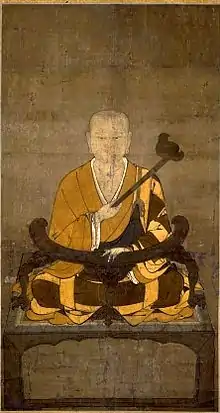Zhi Yi
Zhi Yi (* 538; † 597) war der Begründer des Tiantai-Buddhismus.

Zhiyi
Zhi Yi genoss als Repräsentant der buddhistischen Religion in China das Wohlwollen des Sui-Kaisers Yangdi. Als dieser Kronprinz während der Herrschaft seines Vaters Wendi war, erhielt Zhi Yis Bergkloster regelmäßige Zahlungen aus staatlichen Mitteln. Dies hing auch mit der legitimatorischen Rolle zusammen, die der Buddhismus der neuen Dynastie verlieh.
Literatur
- Rainer Hoffmann, Qiuhua Hu: China. Seine Geschichte von den Anfängen bis zum Ende der Kaiserzeit. Freiburg 2007, ISBN 978-3-7930-9499-9.
- Donner, Neal & Daniel B. Stevenson (1993). The Great Calming and Contemplation. Honolulu: University of Hawai‘i Press.
- Hurvitz, Leon (1962). Chih-i (538–597): An Introduction to the Life and Ideas of a Chinese Buddhist Monk. Mélanges Chinois et Couddhiques XII, Bruxelles: Institut Belge des Hautes Études Chinoises
- Dharmamitra (trans.): The Essentials of Buddhist Meditation by Shramana Zhiyi, Kalavinka Press 2008, ISBN 978-1-935413-00-4.
- Shen, Haiyan. The Profound Meaning of the Lotus Sutra: T’ien-t’ai Philosophy of Buddhism volumes I and II. Delhi: Originals, 2005, ISBN 81-88629-41-3.
This article is issued from Wikipedia. The text is licensed under Creative Commons - Attribution - Sharealike. The authors of the article are listed here. Additional terms may apply for the media files, click on images to show image meta data.